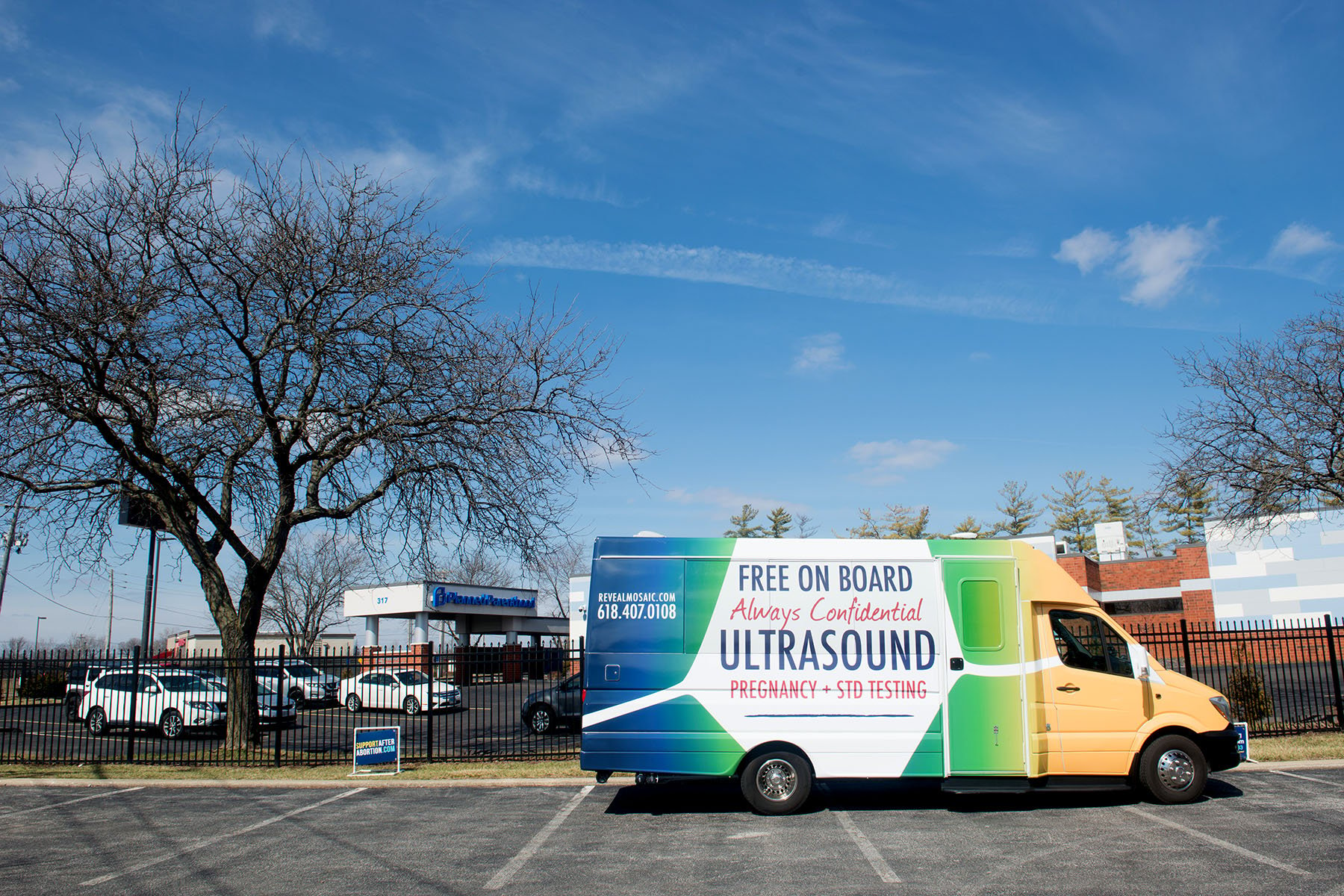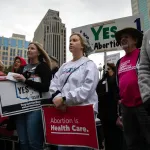Anti-abortion centers and their leaders have been campaigning against the abortion ballot measures in 10 states in the lead up to Election Day. The organizations — also known as crisis pregnancy centers — have sought to remove those measures from state ballots and distributed materials with misleading talking points.
It’s a pattern that shows the increasing significance of anti-abortion centers, which are often religiously affiliated and publicly funded.
These facilities can resemble medical clinics, though they are not held to the same standards as actual health centers and have come under scrutiny for giving people inaccurate information to dissuade them from terminating their pregnancies. They also offer things such as free sonograms, pregnancy tests, parenting classes and diapers, which attracts clients whose options have diminished.
Since the fall of Roe v. Wade allowed states to ban abortion, anti-abortion activists have sought to expand these centers’ influence. Republican-led states have poured hundreds of millions of public dollars into supporting their work, and in some cases given them state contracts. National lobbies and some Republican lawmakers have touted the work of anti-abortion centers, arguing they should play a more meaningful role in providing social services for pregnant people, especially in states that have banned the procedure.
Anti-abortion centers in Arizona, Colorado, Florida, Maryland, Missouri, Montana, Nebraska, Nevada, New York and South Dakota — all states with abortion rights ballot measures this election — have encouraged people to vote against their states’ proposals. Some have shared inflammatory and often misleading posts on their social media pages and distributed literature opposing the measures. Several receive financial support from state grants, according to their 990 tax documents.
“The finding that crisis pregnancy centers are engaging in overt political advocacy and publicly doing this is in line with what we already know — that is that there is actually no distinction between the work crisis pregnancy centers do inside the center and the political advocacy they’re doing as a movement,” said Carly Thomsen, an associate professor at Rice University who studies these facilities. “The anti-abortion movement sees crisis pregnancy centers as the foundation of their movement.”
Because anti-abortion centers often resemble medical clinics, people may not always know about their political agenda. They vastly outnumber abortion clinics, and have wide reach, especially in rural communities, Thomsen said. That influence means some patients could be swayed by their arguments around abortion measures.
But others expressed more skepticism about the electoral impact anti-abortion centers could have.
“I don’t know that they really have a ton of reach among people who are not already aligned with them,” said Andrea Swartzendruber, a professor at the University of Georgia who studies anti-abortion centers. “Those who are following them on social media are already aligned with them. They’re in that echo chamber.”
In Missouri, where the state’s abortion rights measure, Amendment 3, would reverse a near-total ban on the procedure, the Riverways Pregnancy and Family Resource Center organized prayer events in opposition to the Amendment 3. Another local affiliate, the Monarch Family Resource Center, posted online that the measure would give medical providers “a free pass for botched abortions.” Both centers have received thousands of dollars from the state government, and neither responded to a request for comment.
A post from the Pregnancy Resource Center of Panama City, in Florida, urges residents to vote against the state’s abortion rights measure, saying it would allow abortion “through birth” and result in the “removing of all protections for women and children.” The Florida proposal, Amendment 4, would protect abortion rights only until fetal viability, which typically occurs around 22 to 25 weeks. The head of the center did not respond to multiple requests for an interview. In 2023, the center received $435,760 in government grants, per its 990 form.
A North Florida-based facility, the Pregnancy Care Center, has invited people to come to the facility and learn about the state’s abortion measure — an effort to encourage people to vote against Amendment 4 —and distributed “No on 4” signs to attendees. One social media post from the center said the abortion rights measure would “dramatically increase the killing of unborn babies in Florida.”
“We are so actively involved, my schedule is crazy,” said Lori North, the head of the center, said on the phone. North said she was unable to make time for an interview in part because of the heavy demands of campaigning against Amendment 4.
The involvement in direct political advocacy varies by center and state. Anti-abortion centers are typically registered as 501(c)(3) nonprofits, which means they legally cannot endorse political candidates and cannot devote a “substantial” measure of their activities toward lobbying, a measure defined by the Internal Revenue Service. But that can still leave open the door for some level of advocacy.
“We have provided background guidance to network partners who have asked for clarification on what the amendment does,” said Rita Gagliano, executive director of the Florida Pregnancy Care Network, an organization that distributes state funds to anti-abortion centers.
The website for the Colorado Pregnancy Care Alliance, a collection of anti-abortion centers, encourages voters not to support the amendment. Tamra Axworthy, who runs the Colorado-based A Caring Pregnancy Center and is part of a coalition against an abortion rights measure in the state, said she has included information about the state’s ballot measure in a newsletter, and that she has answered questions about the proposal, Amendment 79, when asked.
“We’re doing as much as we can, given our day-to-day tasks,” she said. “Which isn’t much — it’s mostly information dissemination.”
Some abortion providers — notably Planned Parenthood — have been enmeshed in political activism for decades. But that work is done through a separate entity from the nonprofit health care provider: in the case of Planned Parenthood, a distinct 501(c)(4) organization called Planned Parenthood Action Fund, which is legally permitted to engage in political advocacy.
Anti-abortion centers have long had deep ties to conservative politics; Bill Lee, the Republican governor of Tennessee, even helped found one in his state. Research shows a connection between the number of anti-abortion centers in a state and restrictions on the procedure, suggesting they may influence policy-making. And more recently, abortion opponents have been encouraging these facilities to expand their political activity.
At a May conference hosted by Heartbeat International, a major network of anti-abortion centers, one event focused on how centers and their employees could effectively involve themselves in “promoting life-affirming legislation and opposing pro-abortion legislation,” per a summary of the workshop. The workshop also included material on how to navigate the fact that many anti-abortion centers are registered 501(c)(3) nonprofits, which are legally limited in their ability to advocate for specific political candidates.
“Pregnancy centers have tried to stay out of the political arena and I completely understand that, but these pro-abortion activists are coming for you, and you can’t hide from it, and you can’t ignore it,” South Dakota state Rep. Jon Hansen said at the workshop, per a video recording. Hansen did not respond to a request for an interview.
Heartbeat International declined to make someone available for an interview. But in an emailed statement, Andrea Trudden, the organization’s vice president of communications, said centers are choosing for themselves what level of political engagement they want to pursue. When asked if anti-abortion centers might expand that activity in coming elections, Trudden pointed to the limitations placed on those that are registered as 501(c)(3) nonprofits.
“When it comes to abortion-related ballot measures, such as those in Florida, New York, and Missouri, some of our affiliates may choose to engage locally by educating their communities on how these measures could affect access to the life-saving services pregnancy centers offer,” she said. “However, the role of each center varies depending on their capacity and local context.”
With more resources and attention from the anti-abortion movement, these centers could play an even more important role in political advocacy in years to come, said Debra Rosen, executive director of Reproductive Health & Freedom Watch, a watchdog organization.
“They hold significant influence in their communities,” Rosen said.
Since 2022, every proposed abortion rights ballot measure has passed, including in conservative states such as Ohio; anti-abortion measures have failed including in states like Kentucky and Kansas. Florida, which requires a 60 percent approval for any ballot measure, likely represents the toughest fight for abortion rights this year.





